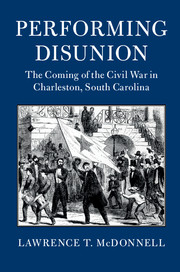8 - War of Factions
from CONTRADICTIONS: STAND NOBLY TOGETHER
Published online by Cambridge University Press: 08 June 2018
Summary
In Charleston in 1860, the memory of these incidents was fresh and powerful. Their lesson was summed up by the melodramatic example of one who spoke too freely and paid with his life for that misstep. At the hour of secession, poet Paul Hamilton Hayne thought wistfully, the ghost of Will Taber still lingered in “Lord John” Russell's bookstore on King Street, a popular radical crossroads. Doubtless it lived on in the offices of the disunionist Mercury over on Broad, where Taber had made his name as editor across four troubled years. Perhaps it still wafted through the barrooms and coffeehouses he had haunted during his brief, rowdy life. Inside the fancy bordellos of the town too it must have seemed that the spirit of so notorious a “low- reckless debaucher” had never departed.
Yet in 1860 the body of William Robinson Taber Jr. was undeniably moldering in an unmarked grave in St. Philip's Episcopal Churchyard, a small, round hole in its skull. Indeed, as elite Charleston understood, Taber had died not once, but twice in “lamentable” fashion. First he had been hanged – in effigy – denounced and driven into exile for his opinions in the winter of 1853. Then young Ed Magrath put a bullet in his brain three years later in a scandalous duel up at the Washington Race Course. Within months, Taber's name was taboo, though his memory lived on, the political meaning of his sacrifice central to the choices Charlestonians made after Lincoln's election. No one better symbolized both the need to uphold the tenets of the South Carolina jeremiad and the dangers inherent in that discipleship.
Taber's early life offered abundant clues of trouble to come. Certainly he did not take after his father, the Rhode Island bookkeeper who made patient accumulation and self- control his watchwords. Coming south in the 1820s, the elder Taber labored shrewdly to build a place at the heart of cotton's kingdom. By 1825, the thirty- three- year- old Yankee had married Emma Smith, sister to rising sectionalist politician Robert Barnwell Smith, and stayed close to his in- laws near Beaufort for several years thereafter.
- Type
- Chapter
- Information
- Performing DisunionThe Coming of the Civil War in Charleston, South Carolina, pp. 153 - 185Publisher: Cambridge University PressPrint publication year: 2018



